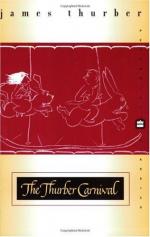|
This section contains 7,169 words (approx. 24 pages at 300 words per page) |

|
Dictionary of Literary Biography on James (Grover) Thurber
Next to Mark Twain, James Thurber is the most critically acclaimed humorist in American literary history. Like Twain he first established his reputation as a journalist. By the time he died, he was recognized as one of the world's paramount short-story writers and a major stylist. Historically Thurber follows the traditional horse-sense humorists, and he is clearly related to the nineteenth- and early-twentieth-century journalistic humorists and literary comedians, such as Twain, George H. Derby (who wrote "A New System of English Grammar," collected in his Phoenixiana in 1856), Robert Henry Newell, Charles Farrar Browne, David Ross Locke, Henry W. Shaw, Charles H. Smith, Edgar Wilson Nye, George Ade (the author of a series of fables in slang), Finley Peter Dunne, Ambrose Bierce, and Ring Lardner, among others. Thurber's "Little Man" character draws from the work of Robert Benchley, and perhaps later from that of S. J. Perelman, but Thurber...
|
This section contains 7,169 words (approx. 24 pages at 300 words per page) |

|


